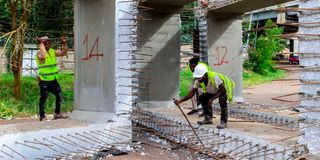Premium
How TVETs have lifted construction industry in the past 100 years

Construction work at an affordable housing project in Bahati, Nakuru County on May 22, 2024.
What you need to know:
- TVET institutions began their centenary celebrations in March.
- The final celebrations will be in July at Kabete National Polytechnic.
The Federation of Kenya Employers (FKE) released the Skills Needs Survey Report in November last year.
The top technical and vocational education and training (TVET) skills in demand were in transport and logistics at 21.3 per cent, electrical (21.1 per cent) and building and construction at 18.2 per cent.
Notably, the most difficult-to-fill vacancies requiring TVET skill level were in architecture, building and construction at 36 per cent), engineering (30 per cent) and transport, distribution and logistics (48 per cent), while those that mostly require first level university education are in Information Technology at 77 per cent and finance and business management (71 per cent).
The report paints a picture of the glaring labour gap in Kenya’s construction industry.
This skills gap is, however, a challenge worldwide. Many countries are experiencing a construction boom, fuelled by growing populations and high demand for housing.
The boom is punctuated by labour shortage in technical construction fields.
Construction labour shortages have been attributed to many factors, including negative perceptions, retiring skilled staff, an ageing population (in parts of Europe), evolving construction tools and methods and gaps in education.
TVET institutions began their centenary celebrations in March. Delegates lit a torch at Nyeri Polytechnic, which will be taken around the country to create awareness of the role the sector plays in educating Kenya’s workforce.
The final celebrations will be in July at Kabete National Polytechnic, the first TVET college in Kenya.
Today, we look at TVETs’ scorecard on bridging the skills gap in construction and other sectors.
Brian Waweru, 24 a plumber in Nairobi, joined construction after high school. Waweru began with general unskilled site work from 2019 to 2020.
During this period, he took an interest in plumbing and started learning informally from an experienced plumber. In 2021, Waweru took the decision to specialise in plumbing and enrolled for a course.
“I looked at my options and realised plumbing was not complicated. I also love working with my hands. Compared to office work, plumbing pays well,” he says.
“I joined a technical institute in 2021 and graduated after two years of classwork and a three-month industrial attachment.”
Waweru says he was already attracting opportunities in 2023 and there has been a consistent workflow since. The demand for plumbers is high in Kenya.
He takes his work to many counties. Even when lucrative deals are low, there is always a contractor looking to give him work.
On whether the two-year course was relevant to the actual profession, Waweru says class work was mostly theoretical with no relevant practicals.

Caroline Adhiambo at a construction site. The national polytechnic student has a diploma in building and construction.
“Equipment are evolving fast and I have to keep learning. I learn a lot from other professionals in the field and the internet is also helpful. The language used to explain things on site is simplified, compared to class work,” Waweru says.
“In a formal class setting, we imagine the appearance of different tools but when at a site, I even hold the gadget and use it.”
Waweru says he has never regretted taking the course, adding that there is a significant difference between a trained plumber and a self-taught one.
“The way we handle clients is different. Soft skills like communication and how we present ourselves on site are different. School makes you a professional,” Waweru adds.
He has learnt to take the profession seriously and treat it like formal business.
Given the bullish nature of the industry, where not being paid for work done is common, Waweru understands clever business practices like insisting on down payment before getting to a construction site.
He also knows how to assess work with a professional eye and generate quotations before embarking on a project.
These things cannot be learnt on the streets. Plumbing as a profession has other challenges.
“Some jobs are in far flung sites. That can be costly and reduces work-life balance. Some clients withhold payments after work is complete,” he says.
“Some are friendly in the beginning but become dodgy later. Payment issues are more common where we are on a sub-contract.”
Waweru says plumbing is on high demand compared to other construction fields like masonry, “which is congested”.
Electricity work is also in plenty but most projects tend to favour the older experienced workers due to the sensitive nature of the field.
To attract more young people into skilled construction careers, Waweru says Kenyans need to change perceptions.
“As a young man, I didn’t like construction. Some people have given the industry a bad name, associating it with dirt. We are changing that by working on the image,” he says.
“I try to be as presentable as possible. Young people need to embrace working with their hands and realise that construction pays. TVET institutes need to focus on practical work and less theory. There are many things we learnt in class but which I never encountered until I started working.”
DN2 Property sought insights from the government agency in charge of registering TVET colleges on the milestones and what is to be expected.
The TVET Authority (TVETA) was formed in 2013 to register and regulate the institutions. TVETA Director-General, Kipkirui Langat, says there were more than 800 registered TVET institutions by the Ministry of Higher Education, Science and Technology at the time.
The colleges accredited by the authority is now number at least 2,368.
Dr Langat says there are many achievements by the TVET worth celebrating. The number of institutions has grown significantly and enrolment has more than doubled.
“The quality of the trainees has improved tremendously such that some high school students who qualify for university choose TVET. With the establishment of the authority, quality assurance of TVETs has improved,” Dr Langat says.

Kenya National Highway Authority employees at a pedestrian underpass along Uhuru Highway on April 1, 2024.
“The government is investing heavily in infrastructure in public institutions with a target of at least one TVET institution per constituency. There are investments in equipment for public TVET institutions and increased development partner support, including the African Development Bank, the Dutch government, China and Canada.”
Dr Langat says the authority carries out research – especially tracer studies from TVET institutions – regarding graduates to measure the effectiveness of market-oriented courses.
The tracer study reports guide on the rate of absorption of graduates per area of specialisation. In addition, the authority is engaged in a training needs assessment to guide on industry demands.
TVETA plans regular research, especially on tracer studies regarding the progression of graduates from the institutions as well as develop standards based on international best practices and benchmarking with involvement of relevant industry players.
On May 20, the Kenya National Bureau of Statistics launched the Economic Survey Report, 2024 touching on multiple sectors.
The survey presents comprehensive data on the state of TVET enrolment versus opportunities in construction.
According to the data presented, enrolment in TVET institutions grew by 14.3 per cent to 642,726 trainees in 2023 while university admission is expected to grow by 2.9 per cent.
The shifting focus from university degrees to technical careers may be a step in bridging the gap between skills and industry needs.
According to the data, there are more Public TVET institutions than private ones.
The number of females joining the institutions increased by 13.7 per cent to 295,391 while male trainees increased by 14.7 per cent to 347,335 in 2023.
National polytechnics have, however, experienced a decline in student numbers by 7.9 per cent from 113,613 in 2022 to 104,617 last year.
Kisii National Polytechnic registered the highest increase in enrolment at 46.9 per cent from 10,680 in 2022 to 15,694 in 2023, whereas Eldoret National Polytechnic recorded the largest decline from 20,700 in 2022 to 11,379 in 2023, a 45 per cent fall.
Student enrolment in Vocational Training Colleges decreased by four per cent to 155,746 in 2023.
Similarly, enrolment in private TVET institutes fell by 19.8 per cent to 93,828 while that of public technical colleges was up by 70.1 per cent to 288,535 in the review period.
The survey notes that the government is committed to revamping TVET, “partly through loans and bursary to students”.
The total number of TVET student loan applicants rose by 40.9 per cent from 161,600 in the 2022/23 academic year to 227,800 in 2023/24, according to the report.
Comparatively, additional data on the state of the construction show that the industry is growing at a steady pace that can accommodate new workers.

Construction workers laying down steel frames on an on-going building in Ngara, Nairobi on March 15, 2024.
More buildings, especially in the residential section of the industry, were constructed in 2023.
There is an even bigger budget for housing by the government, which is likely to go into what it calls affordable housing units.
More than Sh92 billion will go into housing in the 2023/24 financial year.
The Economic Survey estimates that the monthly average basic wages for the unskilled and skilled workers declined by 4.5 and 10.9 per cent respectively, while that of semi-skilled workers rose by three per cent last year.
Unstable remuneration models in construction could be one of the factors discouraging people from pursuing careers in the field.
A closer look at these numbers, however, reveals that it’s not all gloom and doom.
The monthly average basic wages in construction for an unskilled worker in 2023 was Sh27,585, while a semi-skilled employee got Sh38,611.
Plumbers, electricians, welders, woodwork experts, heavy equipment operators and other specialised professionals earned a monthly average wage of Sh44,391 in 2023, down from Sh49,816 the previous year, the report says.





